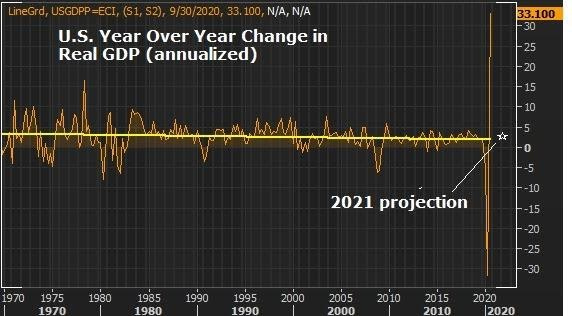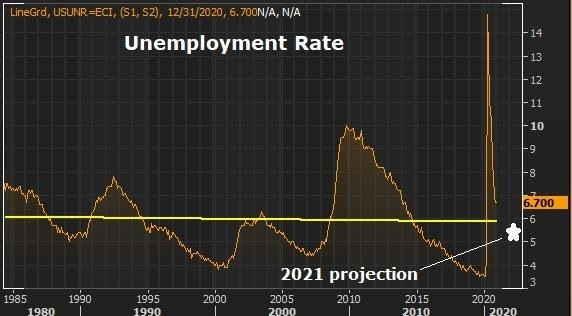The Congressional Budget Office (CBO) - an "objective, impartial, and nonpartisan" group of experts with a mission of helping Congress make effective budget and economic policy published its Economic Outlook yesterday morning.
The CBO has projected that the U.S. economy will fully recover to new highs in economic output by the middle of this year, growing at an estimated 3.7% annualised rate, with unemployment to fall to 5.3% this year, and inflation will remain a very soft 1.5%.
Let's take a look at those numbers with some historical context ...
The above chart is 50 years of quarterly year-over-year change in U.S GDP (annualized). This line of regression (yellow line) is slightly downward sloping and comes in just under 2% - that happens to be about where economists have been saying, for years, is the "new normal" growth rate. This year, the projection from the CBO is for 3.7% growth.
We know that the fiscal and monetary response has been far bigger than the damage to economic output - the economy contracted by $2.2 trillion in 2020, from Q1 through Q2 and the response has been $3 trillion from the Fed (in balance sheet expansion) plus $2.7 trillion in fiscal stimulus from the federal government.
Not surprisingly, the jobs market has made huge gains - here's a look at the projected unemployment rate...
As you can see, if we draw a line of regression (yellow line) over the past 35 years of monthly unemployment data, the CBO projected unemployment rate for 2021 comes in lower.
What about inflation?
Despite projections of hot growth and continued improvement in jobs, and despite the deluge of liquidity already deployed through fiscal and monetary policy, the CBO projects the same subdued inflation we've had for decades.
It’s important to note: These projections from the CBO assume that current laws on taxes and spending remain in place (as of January 12), and that no significant additional emergency funding or aid is provided.
One might ask, why would Congress approve another $1.9 trillion in "aid?” This should make us all very concerned about the inflationary consequences.






